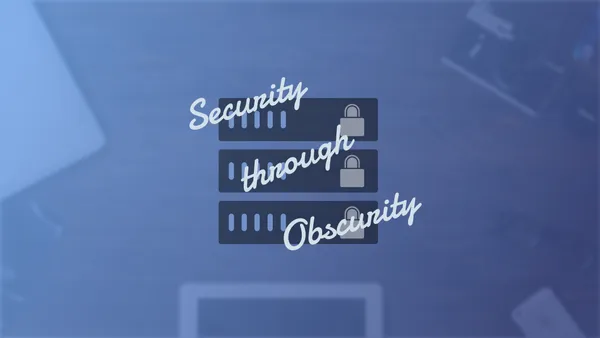The Introduction
Obscurity in cyber security refers to the idea of using obscurity, or the state of being unknown or difficult to understand, as a way to protect against cyber threats. Security through obscurity can provide some benefits in terms of cyber security, it is important to carefully weigh the positive/negative effects when using it as a security strategy.
The Good
There are several potential benefits to using obscurity in cyber security, including:
- Increased difficulty for attackers: By making it difficult for attackers to understand or find a particular system or network, obscurity can make it more challenging for them to launch successful attacks. This can be particularly effective for hiding sensitive information or critical infrastructure from potential attackers.
- Reduced attractiveness for attackers: If an attacker does not know about a particular system or network, they are unlikely to target it. This can make obscurity an effective deterrent for attackers, who may be more likely to focus their efforts on easier targets.
- Increased security through obscurity: In some cases, obscurity can provide a level of security on its own. For example, using obscure or complex passwords can make it more difficult for attackers to guess them, even if they are able to access the system.
The Bad
While obscurity can provide some benefits in terms of cyber security, there are also several potential negative effects to consider. These include:
- False sense of security: Using obscurity as a primary protection method can give individuals or organizations a false sense of security. If they believe that their systems or networks are secure simply because they are unknown or difficult to understand, they may be less likely to implement other security measures, such as strong authentication or access controls. This can leave them vulnerable to attacks that can bypass obscurity-based defenses.
- Increased difficulty for legitimate users: Obscurity can make it more difficult for legitimate users to access systems or networks. For example, using complex or obscure passwords can make it difficult for users to remember them, leading to increased instances of password reset requests and decreased productivity.
- Potential for exploits: Obscurity is not a foolproof method of protection, and attackers can eventually find ways to overcome it. In some cases, obscurity can even make systems or networks more vulnerable to attack, as attackers may be able to exploit the fact that the system is unknown or difficult to understand.
Non-Standard Ports Example
There can be a benefit to not using standard ports when configuring services on a server. Standard ports are pre-defined ports that are used by certain services or applications. For example, web servers typically use port 80 for HTTP traffic and port 443 for HTTPS traffic. By using non-standard ports, you can make it more difficult for attackers to find and exploit vulnerabilities in your server.
Obscuring ports can help to improve the security of your server because attackers will not know which ports to look for. The hackers will have to try more potential port numbers in order to find the services that you are running. With that being said, using non-standard ports can also make it more difficult for legitimate users to access your services because they will have to specify the non-standard port number in order to connect to your server.
This can be inconvenient for users, so it is important to weigh the security benefits against the potential inconvenience when deciding whether to use non-standard ports.
Obscuring Hostnames of Machines Example
Obscuring hostnames refers to the practice of hiding or disguising the true names of hosts on a network. This can be done for a variety of reasons, such as to make it more difficult for attackers to identify and target specific hosts, to reduce the amount of information that is exposed about the network, or to improve the overall security of the network.
There are both positive and negative effects of obscuring hostnames. Some potential positive effects include:
- Making it harder for attackers to identify and target specific hosts on the network. By hiding the true hostnames, attackers may have a harder time gathering information about the network and finding vulnerabilities to exploit.
- Reducing the amount of information that is exposed about the network. By obscuring hostnames, you can limit the amount of information that is publicly available about the network and its hosts, which can help prevent attackers from gaining a foothold on the network.
- Improving the overall security of the network. By making it more difficult for attackers to gather information and target specific hosts, obscuring hostnames can help prevent successful attacks and improve the overall security of the network.
However, there are also potential negative effects of obscuring hostnames, including:
- Making it harder for legitimate users to identify and access specific hosts on the network. If hostnames are obscured, it can be more difficult for legitimate users to find and connect to the hosts that they need, which can lead to frustration and reduced productivity.
- Increasing the complexity of managing the network. Obscuring hostnames can make it more difficult for network administrators to manage the network and troubleshoot problems, as they may have to work with obscured hostnames instead of the true hostnames of the hosts.
- Reducing the effectiveness of security tools and processes. If hostnames are obscured, security tools and processes that rely on hostname information may not be able to function properly, which can reduce the effectiveness of the security measures in place.
Overall, the effects of obscuring hostnames will depend on the specific context and the goals of the network. In some cases, the benefits of obscuring hostnames may outweigh the drawbacks, while in other cases the drawbacks may outweigh the benefits. It is important to carefully consider the potential effects of obscuring hostnames and to weigh the pros and cons before implementing this practice on a network.
The Conclusion
Overall, obscurity can be useful in a comprehensive cyber security strategy. It can provide an additional layer of protection and make it more difficult for attackers to access sensitive information or systems. However, it is important to note that obscurity should not be relied upon as the sole method of protection, as attackers can eventually find ways to overcome it. It should be used with other security measures, such as strong authentication and access controls, to provide the best possible defense against cyber threats.
Full Disclosure
Most of this article is comprised of facts and opinions. The featured background image was created by andyoneru and is available on Unsplash. I added a blur and a gradient overlay. In addition, I added some shapes to convey the server, locking, and obscurity.







